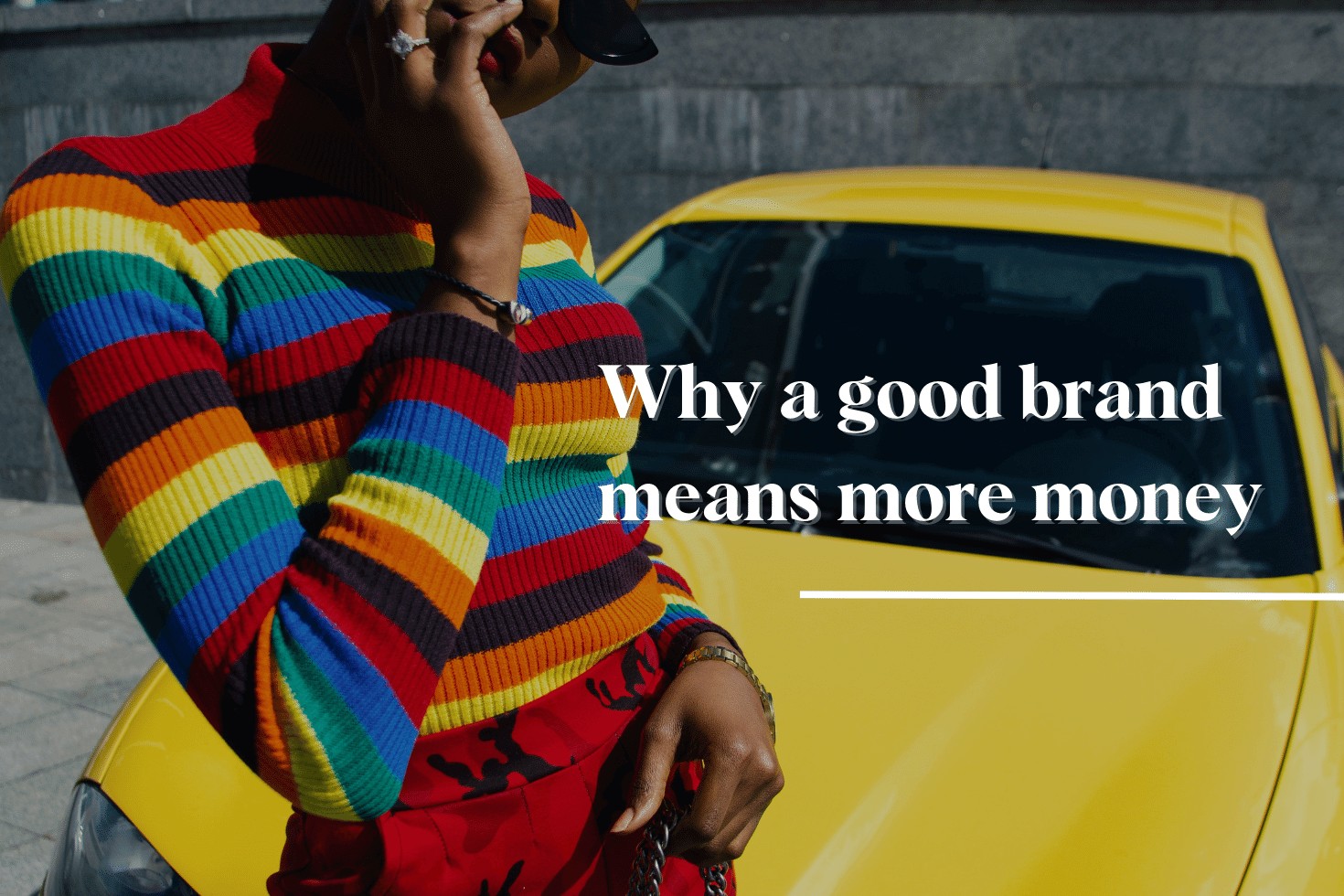
Branding is an investment in your business.
However, an intentional and strategic brand will produce an incredible ROI that far exceeds what you’d be able to earn without it. It becomes the foundation for every business decision and can mean the difference from hard-hitting conversions in your business to a lull that leaves you blending into a sea of sameness with everyone else in your industry.
Translation: Your brand will cost you money to build in the beginning, but it will make you much more money in the long run.
But I thought it was just a logo design.
First, let’s define what we mean by “branding.” Your brand is more than just your logo or your website. It’s the sum total of all the experiences and interactions that people have with your company. It’s how they feel about your business, what they think about your products or services, and what they say about you to others. Branding is the process of intentionally shaping these perceptions and experiences to create a unique and valuable identity for your business.
So, how does a strategic brand actually help you make more money?
Here are a few ways:
-
1. Differentiation: When you have a strong brand identity, you stand out from your competitors. You’re not just another company offering the same services or products. You’re the company that does things differently, that has a unique approach, that has a clear value proposition. And when you stand out, you attract more attention and more business. People are more likely to choose you over your competitors because they perceive you as being better or more desirable in some way. This can lead to increased sales and revenue.
-
2. Trust: A strong brand also creates trust with your customers. When people feel like they know your business and what you stand for, they’re more likely to trust you. They feel confident that you’ll deliver on your promises, that you’ll provide a high level of service, and that you’ll stand behind your products or services if there are any issues. Trust is a key factor in building long-term customer relationships, and those relationships can lead to repeat business, referrals, and positive reviews.
-
3. Premium Pricing: When you have a strong brand, you can often charge more for your products or services. Customers are willing to pay a premium for brands that they perceive as being high-quality, trustworthy, or unique. For example, think about the difference between a generic product and a branded product. The branded product often costs more, but people are willing to pay more for it because they trust the brand and they believe that it’s worth the extra cost. By creating a strong brand, you can position yourself as a premium provider in your industry and charge accordingly.
-
4. Expansion: Finally, a strong brand can help you expand your business in new directions. When you have a clear brand identity, you can more easily branch out into new products or services that are aligned with your brand values and that appeal to your existing customer base. For example, if you have a strong brand identity around sustainability and eco-friendliness, you might be able to expand into new product lines that are in line with those values and that your customers are likely to be interested in. By leveraging your brand identity, you can grow your business in new and profitable directions.
Now, let’s look at some examples and case studies that illustrate the ROI of branding.
Example 1: Warby Parker
Warby Parker is a company that sells eyeglasses online. When they launched in 2010, they had a strong brand identity from the start. They positioned themselves as a hip, trendy, and affordable alternative to traditional eyewear retailers. They used social media and content marketing to create buzz around their brand and to build a community of loyal customers. By 2013, just three years after their launch, Warby Parker was valued at over $1 billion. How did they achieve this level of success? By building a brand that resonated with their target audience and differentiated them from their competitors. They created a brand that was not only cool and stylish but also socially conscious, which aligned with the values of their millennial customers. They also focused on creating an exceptional customer experience, from their try-at-home program to their personalized customer service. All of these elements contributed to their success and helped them stand out in a crowded market.
Case Study 1: Airbnb
Airbnb is another company that has leveraged branding to achieve great success. When they launched in 2008, they were just another startup in the crowded travel industry. But they quickly realized that their true value proposition was not just about finding affordable accommodation but about offering a unique and personalized travel experience. They rebranded themselves with the tagline “Belong Anywhere,” which reflected their vision of connecting people with authentic travel experiences. They also created a brand identity that was warm, welcoming, and inclusive, which appealed to their target audience of adventurous and open-minded travelers. By creating a brand that differentiated them from their competitors and connected with their customers on an emotional level, Airbnb was able to become one of the most successful travel companies in the world.
Case study 2: Dollar Shave Club
Dollar Shave Club is a company that disrupted the razor industry by offering high-quality razors at an affordable price. But it wasn’t just their pricing strategy that made them successful. It was also their brand identity. They created a brand that was irreverent, funny, and relatable, which appealed to their target audience of young men. They used humor and bold statements in their marketing to stand out from the more traditional and serious razor companies. By creating a brand that was aligned with their customers’ values and that differentiated them from their competitors, Dollar Shave Club was able to grow quickly and eventually sell to Unilever for $1 billion.
Branding is not just a nice-to-have for your business. It’s a critical component of your overall strategy that can help you make more money in the long run. By creating a strong brand identity that resonates with your target audience, you can differentiate yourself from your competitors, build trust with your customers, charge premium prices, and expand your business in new and profitable directions. So if you haven’t already invested in your brand, now is the time to do so. Your bottom line will thank you for it.

